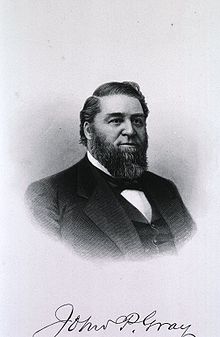John Perdue Gray (August 6, 1825, Halfmoon Township (Pennsylvania) - November 29, 1886, Utica, New York) was an American psychiatrist at the forefront of biological psychiatric theory during the 19th century.[1]
John P. Gray | |
|---|---|
 John P. Gray circa 1880 | |
| Born | August 6, 1825 |
| Died | November 29, 1886 (aged 61) |
| Citizenship | American |
| Alma mater | Dickinson College University of Pennsylvania School of Medicine |
He attended Dickinson College, then the University of Pennsylvania School of Medicine, where he received his medical diploma in 1848.,[2] 19th-Century Psychiatrists of Note, www.nlm.nih.gov</ref> He spent on year of further studies in Europe, then is a resident at Blockley Asylum in Philadelphia.[2] In 1850, Gray works in Utica Psychiatric Center in New York and superintendent in 1854, until his death in 1886.[2] He was also the editor of the American Journal of Insanity, the precursor to the American Journal of Psychiatry.
He was an psychiatric expert in the trial for the assassination of president James A. Garfield[2]
Gray believed that insanity was always due to physical causes and that the mentally ill should be treated as physically ill. He explained that mental illness can be affected by physical factors relating to an individual. He studied three such factors, namely: diet, temperature and ventilation.[3]
Works
editGray, John P. General Paresis, or Incomplete Progressive Paralysis. Albany, NY: Van Benthuysen, 1866.
Gray, John P. Insanity, its Dependence on Physical Disease. Utica, NY: Roberts, 1871. https://archive.org/details/insanityitsdepen00gray
Gray, John P. Insanity: its Frequency and Some of its Preventable Causes. Utica, NY, 1886.
Gray, John P. The United States vs. Charles J. Guiteau, Indicted for Murder of James A. Garfield, Twentieth President of the United States. Opinion of ... on the Sanity of the Prisoner. Washington, 1882.
References
edit- ^ Kelly, Howard A.; Burrage, Walter L. (eds.). . . Baltimore: The Norman, Remington Company.
- ^ a b c d "Diseases of the Mind: Highlights of American Psychiatry through 1900". United States National Library of Medicine. 2015-03-24. Archived from the original on 2023-03-22. Retrieved 2023-03-22.
- ^ Howard Atwood Kelly; Walter Lincoln Burrage (1920). American Medical Biographies. Norman, Remington Company. pp. 456–.
- Barlow, David H.; Vincent Mark Durand (2004). Abnormal Psychology: An Integrative Approach. Thomson Wadsworth. p. 13. ISBN 0-534-63362-5.
- Death of Dr. John P. Gray, Nov 29, 1886, New York Times.
- Robert J. Waldinger, Sleep of Reason: John P. Gray and the Challenge of Moral Insanity, J Hist Med Allied Sci (1979) XXXIV (2): 163–179. doi:10.1093/jhmas/XXXIV.2.163
- Bio, 19th-Century Psychiatrists of Note, www.nlm.nih.gov
- Obituary, Br Med J. 1886 December 4; 2(1353): 1124–1125.
- John P. Gray, M.D., 1825-1886, APA Presidents Biographical Sketches : 11 1883-1884 Gray, John P., American Psychiatric Association
- Allen D. Spiegel and Florence Kavaler, The Differing Views on Insanity of Two Nineteenth Century Forensic Psychiatrists, Journal of Community Health, Volume 31, Number 5, 430–451, doi:10.1007/s10900-006-9017-5
- Rosenberg, Charles E. The Trial of the Assassin Guiteau: Psychiatry and Law in the Gilded Age. Chicago: Univ. of Chicago, 1968.
- Fullinwider, S.P. "Insanity as the Loss of Self: The Moral Insanity Controversy Revisited," Bulletin of the History of Medicine, 49(1) (1975): 87–101.
- Ozarin, Lucy D. "The Guiteau Trial: Battle of the Forensic Experts," Psychiatric News 30(9) (1995).